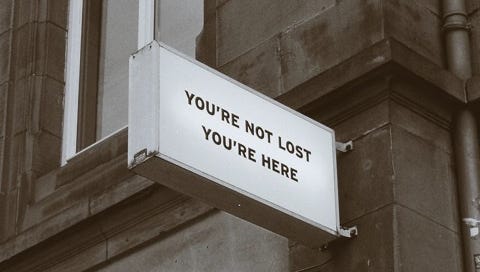Boundaries don’t just keep people out, they help maintain a sense of clarity within.
An example of this for myself is when I don’t pay attention to where my energy is going, how I talk to myself, or notice where my time and focus is, I notice more disorganization, burnout and generally do less self-care.
In my work, I’ve observed that there is a common misconception that boundaries are only useful when it comes to interacting with others. Many people may set boundaries with their loved ones, their workplace and their home and forget that the boundaries you set within matter too.
There are self boundaries on what you will or won’t do, boundaries around your values and goals, your ethics, motivation, how you see/talk yourself, your capacity, time and/or energy. These are just a few examples of some non-obvious boundaries with self that support our mental health.
Because setting limits with yourself isn’t always as simple as just blocking off time in your calendar to rest, it’s easy to stop short of identifying them due to how embedded they are into our everyday ways of living life and interacting with ourselves.
Saying no to others and doing so intentionally is very different in comparison to saying no to ourselves and finding the motivation to show up for our needs and values with that same purpose. Especially knowing that similarly to the boundaries we set with others, there may also be uncomfortable feelings of frustration, disappointment, internal pushback and guilt.
Some examples of self boundaries to set or pay attention to:
Boundaries around self compassion and negative self talk.
Boundaries around care tasks that you may neglect in favour of caring for others.
Boundaries around who you follow, listen and pay attention to that consumes your focus and energy.
Boundaries around following your values and ethics even when it is hard to do so.
Boundaries around how you approach motivation, internal pressure to succeed and productivity.
Boundaries around how you will respond to conflict and tension around you.
Setting boundaries with self will look different for everyone, because each of us has a unique perspective on what makes our lives feel more connected, intentional and authentic.
Empower yourself to have limits with yourself that feel like opportunities, not walls. Remember that boundaries are for you, and if they don’t feel beneficial for you in any way, or aren’t serving a greater purpose in your life (short term or long term), let them go.
The key is to take what feels right, assess what you need and prioritize those things while you’re on your healing journey. Unfortunately, you are the only person who can set these boundaries, and you’ll need to trust yourself to show up non-judgmentally and honestly.
Be mindful of unnecessary pressure to “do everything right.” You will make mistakes in your healing journey, it is part of the process.
As you reflect on this, remember that you are safe. You deserve time to rest. You are allowed to set limits. Showing up for yourself, trusting yourself and committing to mindful non-judgmental awareness isn’t an overnight process.
Sending love,
Meg






